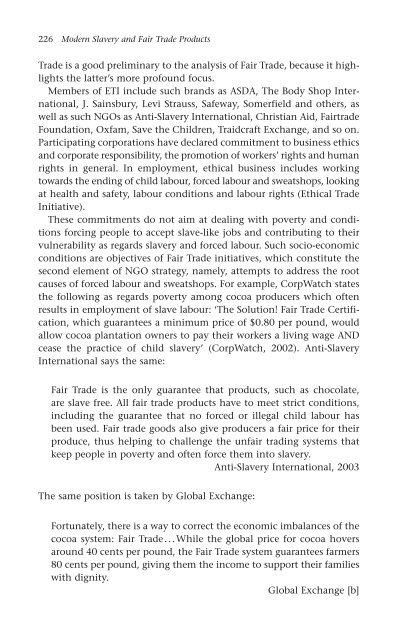3071-The political economy of new slavery
3071-The political economy of new slavery
3071-The political economy of new slavery
Create successful ePaper yourself
Turn your PDF publications into a flip-book with our unique Google optimized e-Paper software.
226 Modern Slavery and Fair Trade Products<br />
Trade is a good preliminary to the analysis <strong>of</strong> Fair Trade, because it highlights<br />
the latter’s more pr<strong>of</strong>ound focus.<br />
Members <strong>of</strong> ETI include such brands as ASDA, <strong>The</strong> Body Shop International,<br />
J. Sainsbury, Levi Strauss, Safeway, Somerfield and others, as<br />
well as such NGOs as Anti-Slavery International, Christian Aid, Fairtrade<br />
Foundation, Oxfam, Save the Children, Traidcraft Exchange, and so on.<br />
Participating corporations have declared commitment to business ethics<br />
and corporate responsibility, the promotion <strong>of</strong> workers’ rights and human<br />
rights in general. In employment, ethical business includes working<br />
towards the ending <strong>of</strong> child labour, forced labour and sweatshops, looking<br />
at health and safety, labour conditions and labour rights (Ethical Trade<br />
Initiative).<br />
<strong>The</strong>se commitments do not aim at dealing with poverty and conditions<br />
forcing people to accept slave-like jobs and contributing to their<br />
vulnerability as regards <strong>slavery</strong> and forced labour. Such socio-economic<br />
conditions are objectives <strong>of</strong> Fair Trade initiatives, which constitute the<br />
second element <strong>of</strong> NGO strategy, namely, attempts to address the root<br />
causes <strong>of</strong> forced labour and sweatshops. For example, CorpWatch states<br />
the following as regards poverty among cocoa producers which <strong>of</strong>ten<br />
results in employment <strong>of</strong> slave labour: ‘<strong>The</strong> Solution! Fair Trade Certification,<br />
which guarantees a minimum price <strong>of</strong> $0.80 per pound, would<br />
allow cocoa plantation owners to pay their workers a living wage AND<br />
cease the practice <strong>of</strong> child <strong>slavery</strong>’ (CorpWatch, 2002). Anti-Slavery<br />
International says the same:<br />
Fair Trade is the only guarantee that products, such as chocolate,<br />
are slave free. All fair trade products have to meet strict conditions,<br />
including the guarantee that no forced or illegal child labour has<br />
been used. Fair trade goods also give producers a fair price for their<br />
produce, thus helping to challenge the unfair trading systems that<br />
keep people in poverty and <strong>of</strong>ten force them into <strong>slavery</strong>.<br />
Anti-Slavery International, 2003<br />
<strong>The</strong> same position is taken by Global Exchange:<br />
Fortunately, there is a way to correct the economic imbalances <strong>of</strong> the<br />
cocoa system: Fair Trade...While the global price for cocoa hovers<br />
around 40 cents per pound, the Fair Trade system guarantees farmers<br />
80 cents per pound, giving them the income to support their families<br />
with dignity.<br />
Global Exchange [b]


